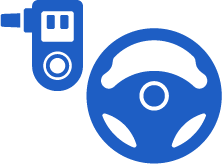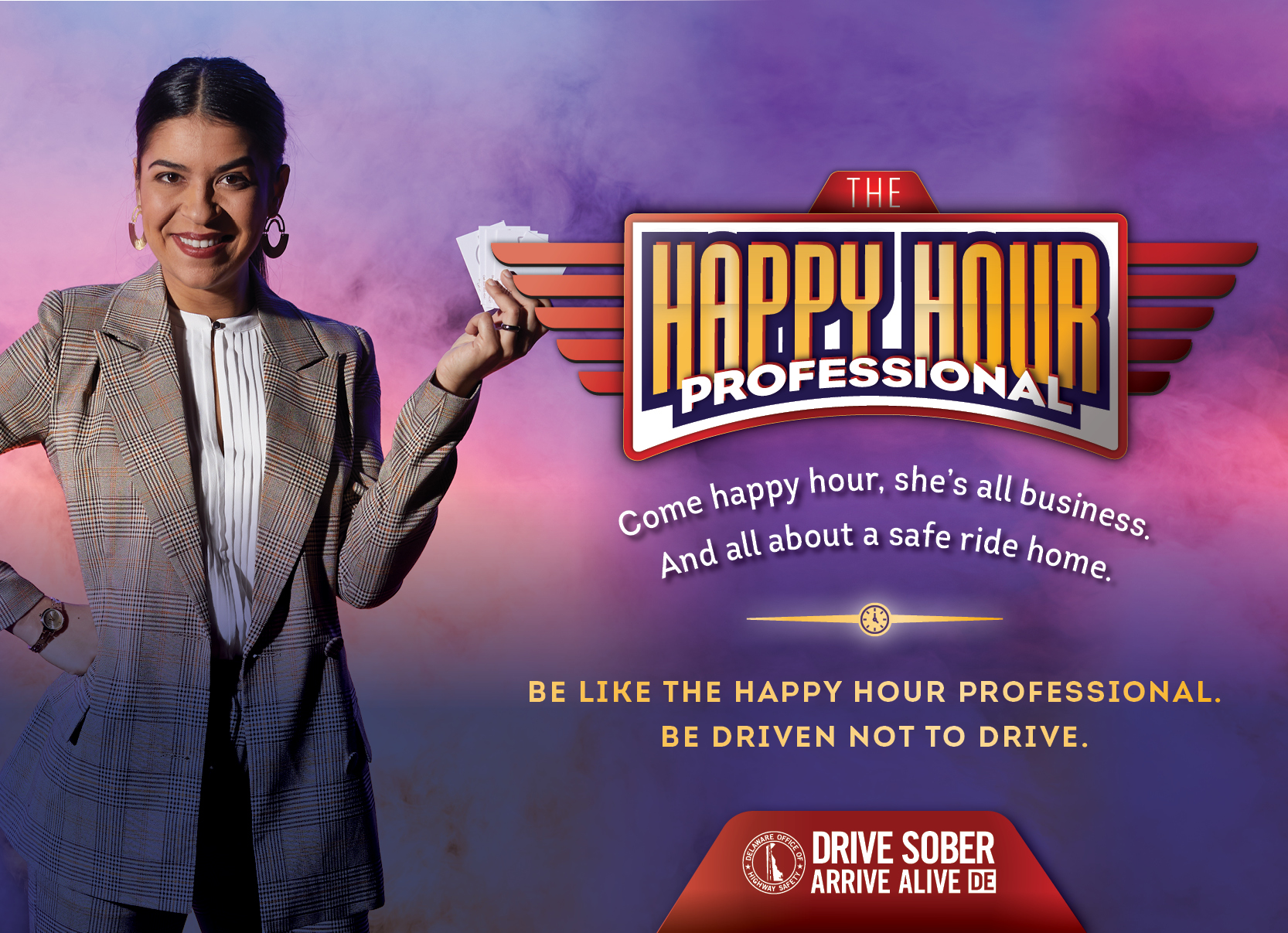Impaired drivers put everyone at risk.
Make the smart choice and plan for a sober ride home – before the party begins.

Drive Sober
THE SOBERING CONSEQUENCES OF A DUI
A DUI can impact virtually every aspect of your life – legally, financially and socially. Don’t risk driving impaired. Always plan a sober ride.
Click a box to learn more about each consequence of a DUI.
Sources:
Delaware DMV
Delaware MV Code

Costs up to $10,000
Costs up to $10,000
This includes fines, court costs, ignition interlock, counseling classes and higher insurance premiums.

Loss of license 12 to 24 months, first offense
Loss of license
First offense: 12-24 months.
Second offense: 18-30 months.
Third offense: 24-36 months.

Loss of independence and mobility
Loss of independence
With no license, DUI offenders must rely on family, friends and rideshares to get around and work within others’ schedules.

Reputational damage
Reputational damage
A DUI stays on a driving record for a minimum of 5 years, potentially harming employment or even educational opportunities.

Required DUI educational classes
DUI educational classes
Offenders may have to complete DUI education classes, which are costly and time-consuming.

Installation of an ignition interlock device (IID)
Ignition interlock device
Even first-time offenders must have a breathalyzer installed on the vehicle registered in their name.

Serious Injury
Serious Injury
Impaired driving can lead to major injuries that may change your life – and the lives of those who may have to care for you.

Fatal Injury
Fatal Injury
The ultimate consequence of driving impaired. In 2023, alcohol was involved in 24% of all fatal crashes in Delaware.

Can you make it safely to the end of the course?
Try it “sober” first and then “impaired” to see how alcohol can impact your driving.
Keep your vehicle on course! Move left and right to avoid all obstacles and arrive alive!

HOW TO PLAN A SOBER RIDE HOME
Drivers can’t accurately assess their own impairment. If you plan to drink, make sure you have a safe way home. Here are some options to keep you — and everyone else — safer on Delaware’s roadways.
WHEN YOU DRIVE DRUNK, YOU’RE NOT ALL THERE
Click the image to see the impact of alcohol on your driving skills.
These are just some of the effects experienced by impaired drivers. See our BAC Gauge for a more comprehensive list.
Impairment Begins: .02% BAC
Alcohol starts affecting the body within minutes, and your judgment is the first to suffer. Decisions like “The light is yellow. Should I slow down?” become difficult and potentially deadly.
Impairment Begins: .05% BAC
Complex motor skills, such as hand/eye/foot coordination, become more difficult for even relatively “simple” maneuvers like making a turn.
Impairment Begins: .08% BAC
Drunk drivers often lack speed control – whether driving too fast or too slowly. Either can be dangerous on Delaware highways.

Impairment Begins: .02% BAC
Very quickly, your senses begin to decline, including the essential skill of rapidly tracking a moving target.
Impairment Begins: .05% BAC
At .05% blood alcohol level, an impaired person may have difficulty steering and keeping their vehicle from weaving in and out of lanes.
Impairment Begins: .05% BAC
Alcohol slows your brain’s ability to process dangerous situations and may slow your reaction times by 15 to 25 percent.
Gauging the Effects of Alcohol
Blood alcohol concentration (BAC) refers to the percent of alcohol in a person’s bloodstream. In Delaware, a person is legally intoxicated if they have a BAC of .08% or higher. BAC is affected by many things, including the amount of alcohol consumed, the period of time in which it was consumed, gender, body weight and body fat percentage. Only the passage of time will lower a BAC.
Learn more here.
Select a BAC level to see the typical effects of alcohol on you and your driving.
BAC
Blood Alcohol Concentration
Effects on You
- Some loss of judgment
- Relaxation
- Slight body warmth
- Altered mood
- Exaggerated behavior
- May have loss of small muscle control (e.g., focusing your eyes)
- Impaired judgment
- Lowered alertness
- Release of inhibition
- Muscle coordination becomes poor (e.g., balance, speech, vision, reaction time and hearing)
- Harder to detect danger
- Judgment, self-control, reasoning and memory are impaired
- Clear deterioration of reaction time and control
- Slurred speech, poor coordination and slowed thinking
- Far less muscle control than normal
- Vomiting may occur (unless this level is reached slowly, or if a person has developed a tolerance for alcohol)
- Major loss of balance
Effects on Your Driving
- Decline in visual functions (rapid tracking of a moving target)
- Decline in the ability to perform two tasks at the same time (divided attention)
- Reduced coordination
- Reduced ability to track moving objects
- Difficulty steering
- Reduced response to emergency driving situations
- Concentration
- Short-term memory loss
- Speed control
- Reduced information processing capability (e.g., signal detection, visual search)
- Impaired perception
- Reduced ability to maintain lane position and brake appropriately
- Substantial impairment in vehicle control, attention to driving task, and in necessary visual and auditory information processing
Impaired Driving Simulator
Delaware Edition
Warning: Some flashing lights sequences or patterns may affect photosensitive viewers.
Driving is complicated even when you’re sober. Impaired drivers aren’t up to the task.
Disclaimer: The tool has been developed to simulate the effects of alcohol impairment on driving. The driver in the video did not film while operating the vehicle and is not under the influence of alcohol or drugs. All impaired effects are computer-generated.
NASCAR Driver Ross Chastain Encourages Delawareans to Drive Sober

Come happy hour, she's all business. And all about a safe ride home. BE LIKE HER. BE DRIVEN NOT TO DRIVE.

How well do you know the facts about alcohol and its effects on your driving? Take our quiz to find out!
1 of 10

Correct! While we all know the dangers of driving impaired by alcohol or marijuana, studies show that the combination of both offers greater crash risk than use of either alone.
Sorry, the correct answer is both. While we all know the dangers of driving impaired by alcohol or marijuana, studies show that the combination of both offers greater crash risk than use of either alone
Resources
- https://www.cdc.gov/transportationsafety/teen_drivers/teendrivers_factsheet.html?CDC_AA_refVal=https%3A%2F%2Fwww.cdc.gov%2Fmotorvehiclesafety%2Fteen_drivers%2Fteendrivers_
Correct! Any amount of alcohol in your system can have an effect on your driving performance – more than you realize.
Sorry, the correct answer is zero. Any amount of alcohol in your system can have an effect on your driving performance – more than you realize.
Resources
- https://www.nhtsa.gov/risky-driving/drunk-driving
Correct! That’s about the same as the national rate, which results in approximately 10,000 U.S. deaths each year.
Sorry, the correct answer is 30%. That’s about the same as the national rate, which results in approximately 10,000 U.S. deaths each year.
Resources
- https://dsp.delaware.gov/wp-content/uploads/sites/118/2021/04/2020-Annual-Traffic-Report. pdf, page 60
Correct! Time is the only thing that can remove alcohol from your body. If you plan to drink, be sure to arrange for a sober ride home.
Sorry, the correct answer is Time. That’s the only thing that can remove alcohol from your body. If you plan to drink, be sure to arrange for a sober ride home.
Resources
- https://uhs.umich.edu/time-to-sober-up
- https://www.addictiongroup.org/blog/sober-up
- https://www.insider.com/things-that-will-not-sober-you-up-2019-7
Correct! Beer, wine and liquor all contain the same kind of alcohol (ethanol). All things being equal, one standard drink should produce the same level of intoxication.
Sorry, the correct answer is Neither. Beer, wine and liquor all contain the same kind of alcohol (ethanol). All things being equal, one standard drink should produce the same level of intoxication.
Resources
- https://www.rethinkingdrinking.niaaa.nih.gov/how-much-is-too-much/what-counts-as-a- drink/whats-a-standard-drink.aspx
- https://nclnet.org/alcohol_how_it_all_adds_up/
Correct! According to the National Highway Transportation and Safety Administration, 30% of Americans will be involved in an alcohol-related crash at some point in their lives.
Sorry, the correct answer is 3 in 10. According to the National Highway Transportation and Safety Administration, 30% of Americans will be involved in an alcohol-related crash at some point in their lives.
Resources
- https://crashstats.nhtsa.dot.gov/Api/Public/Publication/809323
- https://pip.missouri.edu/DrinkingDriving/#:~:text=About%20three%20in%20every%20ten,drunk%20driving%20is%20completely%20preventable
Correct! The 21 to 24 age group has the highest percentage – 27% – of alcohol impaired drivers in fatal crashes.
Sorry, the correct answer is 21 to 24. That age group has the highest percentage – 27% – of alcohol impaired drivers in fatal crashes.
Resources
- NHTSA Traffic Safety Facts, Alcohol-Impaired Driving, 2019 Facts
Correct! Between fines, court costs, counseling classes and the ignition interlock that’s installed on your car, a first DUI can total more than $10,000.
Sorry, the correct answer is $10,000. Between fines, court costs, counseling classes and the ignition interlock that’s installed on your car, a first DUI can total more than $10,000.
Resources
- https://www.nhtsa.gov/risky-driving/drunk-driving
Correct! In 2019, there were 4 male alcohol-impaired drivers involved in a crash for every female alcohol-impaired driver.
Sorry, the correct answer is four times more. In 2019, there were 4 male alcohol-impaired drivers involved in a crash for every female alcohol-impaired driver.
Resources
- NHTSA Traffic Safety Facts, Alcohol-Impaired Driving, 2019 Facts
Correct! You could still be charged with a DUI even if your BAC is lower than 0.08%, but an officer believes your driving is sufficiently impaired.
Sorry, the correct answer is Yes. You could still be charged with a DUI even if your BAC is lower than 0.08%, but an officer believes your driving is sufficiently impaired.
Resources
- https://www.idrivesafely.com/dmv/delaware/laws/dui-and-dwi-laws/

You got 0 out of 10 correct!
You Can't Drive Safely If You're Impaired
That’s why it’s illegal everywhere in the United States to drive while under the influence of alcohol, illicit drugs or even drugs prescribed by your doctor if misused. While they all carry the same severe penalties, different substances can affect you in different ways.
Alcohol, marijuana and other drugs:
Decrease coordination, judgment and reaction times
Cocaine and methamphetamine:
Can make you more aggressive and reckless
Two or more drugs combined (including alcohol):
Can amplify the impairing effects of each drug
Some prescriptions and over-the-counter drugs:
Can cause extreme drowsiness, dizziness and other side effects
DO YOU NEED HELP WITH AN ADDICTION?
Delaware offers personalized substance abuse care through START (Substance Use Treatment and Recovery Transformation), a program that makes it easier to get the help you need, from start to finish. Services include:
- Gateway and peer support
- Substance use screening and assessment
- Medication Assisted Treatment (MAT)
- Short- and long-term residential treatment
- Hospitalization
- Outpatient program
- Social services
- Goal setting
- Housing & transportation
- Behavioral health counseling
- Case management
- Community-based services
Delaware Taxis and Rideshares
If your plans include drinking, don’t drive. Call a rideshare or a cab for a safe and sober ride home.
Andy’s Taxi Service
302-744-9210
Serving New Castle County
Delaware Valley Taxi
302-561-5403
Statewide service
Peter Yellow Taxi
302-339-6886
Serving Newark and Wilmington











